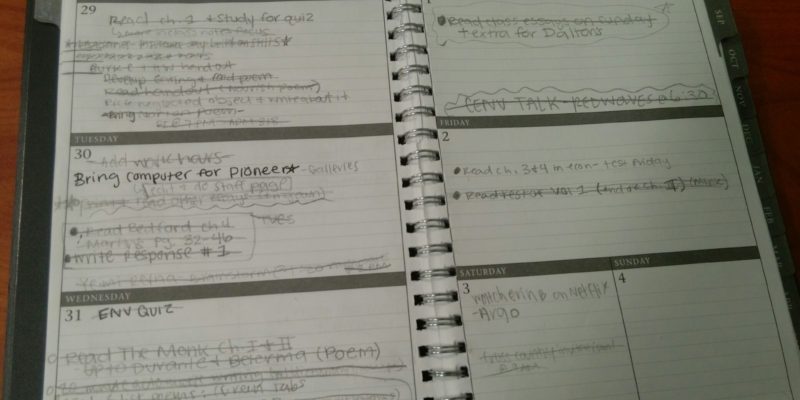8 Ways that Time Management can make College Easier
catawbapioneerstaff September 19, 2016 0 COMMENTS
For many, managing time between classes, homework, and other commitments is nearly impossible when weighed alongside the human needs for water, food, and rest. Breakfast and lunches are skipped in lieu of finishing off that essay or making it to that meeting. And after the stress builds up to the breaking point, classes are skipped to cram in necessary sleep. When students lack control over their lives, time management can be a big leap toward a healthier college lifestyle.
- Figure out your time. Are you a morning, afternoon, evening, or night person? To figure this out, look at when you can knock out assignments most effectively. If you do homework at night, but it takes hours to do something simple, try to mix up your schedule. Instead of overloading on caffeine to stay awake for assignments, see if you do better work by sleeping first, or if an afternoon nap makes working at night easier. Identify what makes working difficult, and try to solve that. If you’re too tired after classes or after dinner, set an alarm and use that time to sleep. Though the general consensus is that college kids never go to sleep, taking naps when you are not mentally capable of getting work done well is an effective way to keep healthy and alert and produce work of a higher caliber.
- Keep a planner. A student approaching college without a planner is sure to be caught unprepared on test days and due dates frequently. Planners are good for not only keeping track of assignments, tests, and due dates, but they can also help students keep a hold on their other commitments, like club meetings and campus events at lunch or nighttime.
- Make a list. Before the start of a new day, or before going to bed, make a list of everything that needs to get done. Make lists for the day, lists for the week, or lists for the month. Having these lists laid out, maybe in a planner, can help you know how the day is already going to go, and show you how productive the day was by how many things are checked off. Be sure to put the biggest assignments, or the homework worth the most important grade, finished first.
- Use a timer. If you’re like me, study breaks are a nice removal from stress, but if you take a study break for a snack, sometimes that snack becomes dinner, and then you just don’t get back to studying again. Use the timer on your phone to strictly limit your snack break to 15-20 minutes, and keep to that.
- Carry it along. Students are constantly on the move, and many times the day falls into a lull while they’re away from their desk. Carrying some assignment or reading with them can help students cross things off the day’s list even if the day isn’t done.
- Be stern when you have to be. Your primary job as a student is to learn, and you’re paying a lot of money to do that. If you feel overwhelmed by the workload, going to the movies is not going to help get anything done. Any friends will understand because we’ve all been there. We all need social time to recharge, but don’t let that time detract from your work and commitments. There will be another chance to see that movie, so study for the test tomorrow before tomorrow comes. Don’t commit to anything that you don’t have time for. If you get everything finished early, then you can enjoy yourself stress-free.
- Close Facebook. Seriously. Don’t keep that tab open when you’re working. Just turn on your homework music and get to work. (Also, if your homework music is distracting, try instrumentals.)
- Get some sleep. If the tired student takes four hours to do a reading, a two-hour nap may cut that reading time to only one hour. Then you’ve created another hour of time that you didn’t have before. The human brain does not function as effectively when it’s fatigued, so make sleep a priority.
First and foremost, “student” is a role we play. It’s our lifestyle, and it’s part of who we are—for now. There will be a day where we stop being a full-time student, and our only learning after that will be in daily life. While it is our role today, don’t let it become the end of your confidence tomorrow. The habits developed in college could stick for the rest of our lives, so try to make them the best you can.
[This article was considered for the Fall 2016 Print Edition of the Catawba Pioneer.]